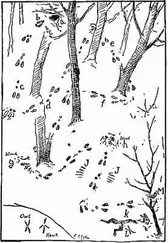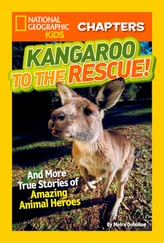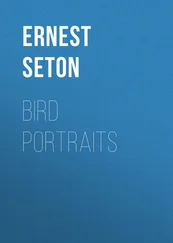Ernest Seton - Animal Heroes
Здесь есть возможность читать онлайн «Ernest Seton - Animal Heroes» весь текст электронной книги совершенно бесплатно (целиком полную версию без сокращений). В некоторых случаях можно слушать аудио, скачать через торрент в формате fb2 и присутствует краткое содержание. Жанр: Природа и животные, на английском языке. Описание произведения, (предисловие) а так же отзывы посетителей доступны на портале библиотеки ЛибКат.
- Название:Animal Heroes
- Автор:
- Жанр:
- Год:неизвестен
- ISBN:нет данных
- Рейтинг книги:3 / 5. Голосов: 1
-
Избранное:Добавить в избранное
- Отзывы:
-
Ваша оценка:
- 60
- 1
- 2
- 3
- 4
- 5
Animal Heroes: краткое содержание, описание и аннотация
Предлагаем к чтению аннотацию, описание, краткое содержание или предисловие (зависит от того, что написал сам автор книги «Animal Heroes»). Если вы не нашли необходимую информацию о книге — напишите в комментариях, мы постараемся отыскать её.
Animal Heroes — читать онлайн бесплатно полную книгу (весь текст) целиком
Ниже представлен текст книги, разбитый по страницам. Система сохранения места последней прочитанной страницы, позволяет с удобством читать онлайн бесплатно книгу «Animal Heroes», без необходимости каждый раз заново искать на чём Вы остановились. Поставьте закладку, и сможете в любой момент перейти на страницу, на которой закончили чтение.
Интервал:
Закладка:
Later that same winter old Renaud, the trapper, with his pretty half-breed daughter, Ninette, came to live in a little log-cabin on the river bank. He knew nothing about Jimmie Hogan, and he was not a little puzzled to find Wolf tracks and signs along the river on both sides between St. Boniface and Fort Garry. He listened with interest and doubt to tales that the Hudson Bay Company's men told of a great Gray-wolf that had come to live in the region about, and even to enter the town at night, and that was in particular attached to the woods about St. Boniface Church.
On Christmas Eve of that year when the bell tolled again as it had done for Jimmie, a lone and melancholy howling from the woods almost convinced Renaud that the stories were true. He knew the wolf-cries—the howl for help, the love song, the lonely wail, and the sharp defiance of the Wolves. This was the lonely wail.
The trapper went to the riverside and gave an answering howl. A shadowy form left the far woods and crossed on the ice to where the man sat, log-still, on a log. It came up near him, circled past and sniffed, then its eye glowed; it growled like a Dog that is a little angry, and glided back into the night.
Thus Renaud knew, and before long many townfolk began to learn, that a huge Gray-wolf was living in their streets, "a Wolf three times as big as the one that used to be chained at Hogan's gin-mill." He was the terror of Dogs, killing them on all possible occasions, and some said, though it was never proven, that he had devoured more than one half-breed who was out on a spree.
And this was the Winnipeg Wolf that I had seen that day in the wintry woods. I had longed to go to his help, thinking the odds so hopelessly against him, but later knowledge changed the thought. I do not know how that fight ended, but I do know that he was seen many times afterward and some of the Dogs were not.
Thus his was the strangest life that ever his kind had known. Free of all the woods and plains, he elected rather to lead a life of daily hazard in the town—each week at least some close escape, and every day a day of daring deeds; finding momentary shelter at times under the very boardwalk crossings. Hating the men and despising the Dogs, he fought his daily way and held the hordes of Curs at bay or slew them when he found them few or single; harried the drunkard, evaded men with guns, learned traps—learned poison, too—just how, we cannot tell, but learn it he did, for he passed it again and again, or served it only with a Wolf's contempt.
Not a street in Winnipeg that he did not know; not a policeman in Winnipeg that had not seen his swift and shadowy form in the gray dawn as he passed where he would; not a Dog in Winnipeg that did not cower and bristle when the telltale wind brought proof that old Garou was crouching near. His only path was the warpath, and all the world his foes. But throughout this lurid, semi-mythic record there was one recurring pleasant thought—Garou never was known to harm a child.
V
Ninette was a desert-born beauty like her Indian mother, but gray-eyed like her Normandy father, a sweet girl of sixteen, the belle of her set. She might have married any one of the richest and steadiest young men of the country, but of course, in feminine perversity her heart was set on that ne'er-do-well, Paul des Roches. A handsome fellow, a good dancer and a fair violinist, Fiddler Paul was in demand at all festivities, but he was a shiftless drunkard and it was even whispered that he had a wife already in Lower Canada. Renaud very properly dismissed him when he came to urge his suit, but dismissed him in vain. Ninette, obedient in all else, would not give up her lover. The very day after her father had ordered him away she promised to meet him in the woods just across the river. It was easy to arrange this, for she was a good Catholic, and across the ice to the church was shorter than going around by the bridge. As she went through the snowy wood to the tryst she noticed that a large gray Dog was following. It seemed quite friendly, and the child (for she was still that) had no fear, but when she came to the place where Paul was waiting, the gray Dog went forward rumbling in its chest. Paul gave one look, knew it for a huge Wolf, then fled like the coward he was. He afterward said he ran for his gun. He must have forgotten where it was, as he climbed the nearest tree to find it. Meanwhile Ninette ran home across the ice to tell Paul's friends of his danger. Not finding any firearms up the tree, the valiant lover made a spear by fastening his knife to a branch and succeeded in giving Garou a painful wound on the head. The savage, creature growled horribly but thenceforth kept at a safe distance, though plainly showing his intention to wait till the man came down. But the approach of a band of rescuers changed his mind, and he went away.
Fiddler Paul found it easier to explain matters to Ninette than he would to any one else. He still stood first in her affections, but so hopelessly ill with her father that they decided on an elopement, as soon as he should return from Fort Alexander, whither he was to go for the Company, as dog-driver. The Factor was very proud of his train Dogs—three great Huskies with curly, bushy tails, big and strong as Calves, but fierce and lawless as pirates. With these the Fiddler Paul was to drive to Fort Alexander from Fort Garry—the bearer of several important packets. He was an expert Dog-driver, which usually means relentlessly cruel. He set off blithely down the river in the morning, after the several necessary drinks of whiskey. He expected to be gone a week, and would then come back with twenty dollars in his pocket, and having thus provided the sinews of war, would carry out the plan of elopement. Away they went down the river on the ice. The big Dogs pulled swiftly but sulkily as he cracked the long whip and shouted, "Allez, allez, marchez." They passed at speed by Renaud's shanty on the bank, and Paul, cracking his whip and running behind the train, waved his hand to Ninette as she stood by the door. Speedily the cariole with the sulky Dogs and drunken driver disappeared around the bend—and that was the last ever seen of Fiddler Paul.
That evening the Huskies came back singly to Fort Garry. They were spattered with frozen blood, and were gashed in several places. But strange to tell they were quite "unhungry."
Runners went on the back trail and recovered the packages. They were lying on the ice unharmed. Fragments of the sled were strewn for a mile or more up the river; not far from the packages were shreds of clothing that had belonged to the Fiddler.
It was quite clear, the Dogs had murdered and eaten their driver.
The Factor was terribly wrought up over the matter. It might cost him his Dogs. He refused to believe the report and set off to sift the evidence for himself. Renaud was chosen to go with him, and before they were within three miles of the fatal place Renaud pointed to a very large track crossing from the east to the west bank of the river, just after the Dog sled. He ran it backward for a mile or more on the eastern bank, noted how it had walked when the Dogs walked and run when they ran, before he turned to the Factor and said: "A beeg Voolf—he come after ze cariole all ze time."
Now they followed the track where it had crossed to the west shore. Two miles above Kildonan woods the Wolf had stopped his gallop to walk over to the sled trail, had followed it a few yards, then had returned to the woods.
"Paul he drop somesin' here, ze packet maybe; ze Voolf he come for smell. He follow so—now he know zat eez ze drunken Paul vot slash heem on ze head."
A mile farther the Wolf track came galloping on the ice behind the cariole. The man track disappeared now, for the driver had leaped on the sled and lashed the Dogs. Here is where he cut adrift the bundles. That is why things were scattered over the ice. See how the Dogs were bounding under the lash. Here was the Fiddler's knife in the snow. He must have dropped it in trying to use it on the Wolf. And here-what! the Wolf track disappears, but the sled track speeds along. The Wolf has leaped on the sled. The Dogs, in terror, added to their speed; but on the sleigh behind them there is a deed of vengeance done. In a moment it is over; both roll off the sled; the Wolf track reappears on the east side to seek the woods. The sled swerves to the west bank, where, after half a mile, it is caught and wrecked on a root.
Читать дальшеИнтервал:
Закладка:
Похожие книги на «Animal Heroes»
Представляем Вашему вниманию похожие книги на «Animal Heroes» списком для выбора. Мы отобрали схожую по названию и смыслу литературу в надежде предоставить читателям больше вариантов отыскать новые, интересные, ещё непрочитанные произведения.
Обсуждение, отзывы о книге «Animal Heroes» и просто собственные мнения читателей. Оставьте ваши комментарии, напишите, что Вы думаете о произведении, его смысле или главных героях. Укажите что конкретно понравилось, а что нет, и почему Вы так считаете.






